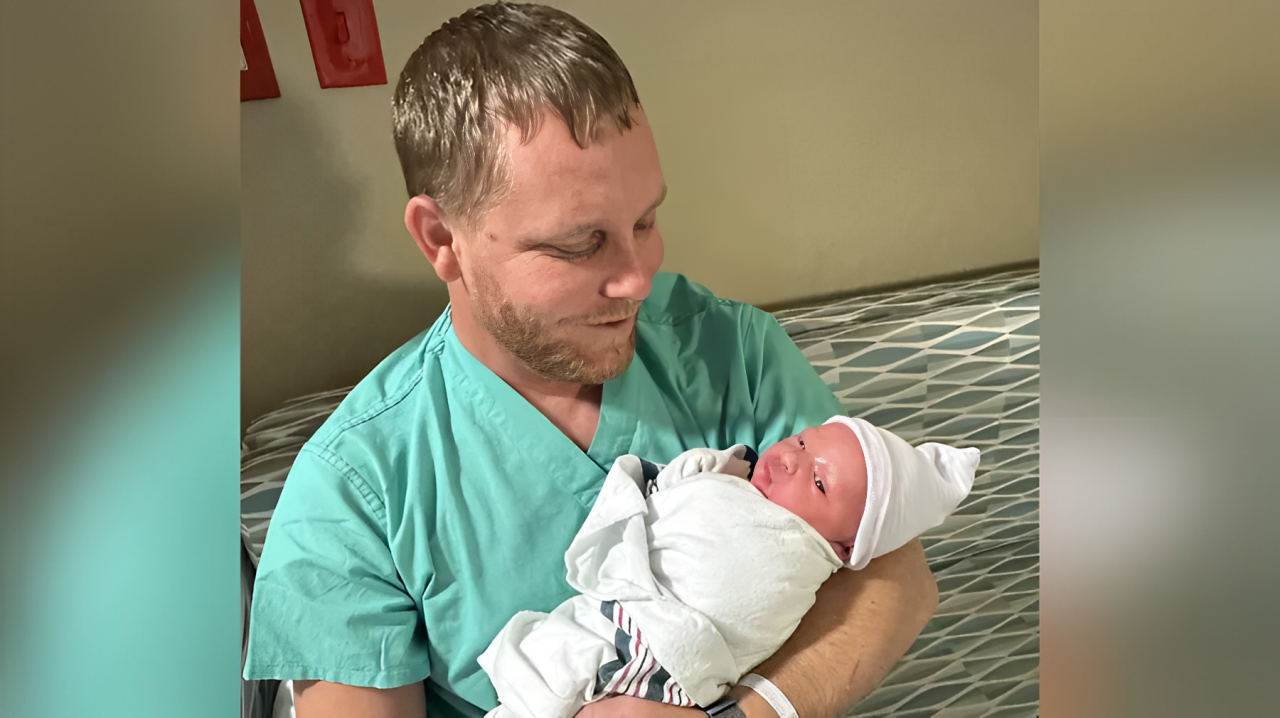Duke Gene Therapy Restores Vision for NC Dad Just in Time for His Son’s Birth!
Tyler Wilfong, a man from Lincolnton, North Carolina, knew from a young age that he would eventually lose his vision due to a genetic eye condition.
Born with retinitis pigmentosa (RP), a disease that causes gradual vision loss, he watched as his sight deteriorated over the years.
For Wilfong, seeing became more difficult as time passed. It wasn’t long before he lost his ability to drive and became increasingly dependent on his wife for day-to-day tasks. His condition affected his independence, and he knew it would only get worse.
He recalls first losing his peripheral and night vision, which made it challenging to navigate even simple tasks like walking through a store. By the time he was 23, his vision had declined so much that he had to give up his driver’s license.
Despite the certainty that his vision would continue to worsen, Wilfong never lost hope. “I kept my faith in God and just had a feeling that one day something would change,” he said.
At that moment, he arrived over 30 years later when he learned about promising gene therapy being offered at Duke Eye Center.
At Duke, doctors explained how gene therapy could potentially change the course of his disease. Dr. Oleg Alekseev, an Assistant Professor of Ophthalmology at Duke, explained that a gene mutation in Wilfong’s retina was preventing his eyes from functioning properly.
The goal of the therapy was to deliver a healthy copy of the gene into his eyes.
Using a specially developed virus as a delivery system, doctors injected the healthy gene into his eye. The virus was designed to specifically infect the cells in the back of the eye and deliver the new, functional gene.
After receiving the therapy in one eye in the spring, Wilfong began to notice an incredible difference in just a few days. “I could actually see my fingers in front of my face, which I’ve never been able to do,” he said.
This breakthrough was life-changing for Wilfong, especially with the upcoming birth of his son.
Not only did the gene therapy restore some of his vision, but it also relieved his fear of completely losing his sight. “That’s a big sense of relief,” he stated.
While Wilfong’s story is hopeful, Duke doctors are quick to point out that the therapy is not a solution for everyone. Dr. Alekseev explained that only a small percentage of people with RP have the specific gene mutation targeted by this therapy.
“This gene represents less than 1% of all retinitis pigmentosa genes out there,” he said. This means that many of the roughly 100,000 Americans living with RP are still waiting for their treatment options.
However, Duke researchers are committed to finding new treatments for vision loss. The success of gene therapy for Wilfong has sparked excitement in the medical community, not just for eye conditions but also for other inherited diseases.
“It has only fueled really an explosion in gene therapy research, not only for the eye but also for all the other inherited diseases,” said Dr. Lejla Vajzovic, an associate professor of ophthalmology at Duke.
As for Wilfong, the timing of this treatment couldn’t have been better. He now has enough vision to care for his newborn son, and he is grateful for the difference it has made in his life. “It’s made a world of difference,” he said, reflecting on the simple joys of fatherhood, such as changing his baby’s clothes.
He’s looking forward to watching his child grow, something he once feared he might never be able to witness.
Read More:
3 Major Pennsylvania Cities Ranked Among Top Rodent-Infested Cities in The U.S.
Shocking! 21 Albany County Grocery Stores Get ‘C’ Grades in Health Inspections
“It’s been a blessing,” Wilfong said, expressing his gratitude for the opportunity to regain his vision and enjoy the special moments of being a father.

